Covid Consumer Mindset Segmentation
Wave 19
In April 2021, we created a segmentation scheme of the U.S. population according to their pandemic-related mindsets.
Through meticulous analysis of the survey data and careful consideration of the results, these six consumer mindsets emerged. Below are the segments and their representation in the population at four points in time—April 2021, August 2021, October 2021, and January 2022. Below you will find an overview of each one’s defining characteristics.
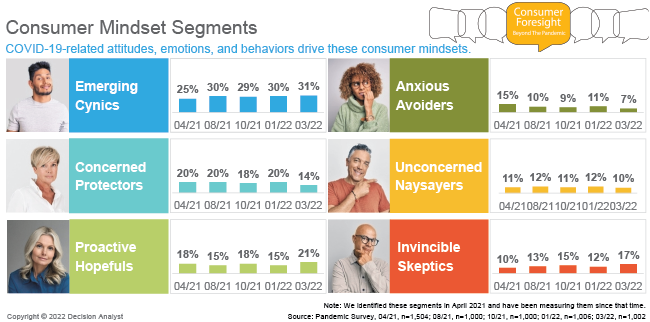
Over time, cynicism has grown somewhat, and anxiety may have subsided a bit. On balance, though, these consumer mindsets have remained relatively steady since being identified in April 2021.
The segments were formed based on pandemic-related behaviors, attitudes about the virus itself as well as the vaccine, and comfort levels with a variety of activities. Additional details about each segment’s characteristics are included in the Appendix of this report.
Please feel free to email Bonnie Janzen or Felicia Rogers directly for additional information. Download our Consumer Foresight Beyond the Pandemic Report Free.
Emerging Cynics
- Tend to be younger adults, often with children in the household; skew slightly male and people of color; earn a moderate income; are split on political affiliation
- Middle-of-the-road concern about COVID-19; fairly balanced emotionally; moderate outlook for improvement in 2021
- Vaccinations relatively likely, though somewhat distrustful in their vaccine attitudes Less likely to social distance, use PPE, or trust the government to make sound decisions
- Reasonably comfortable going places and gathering with others
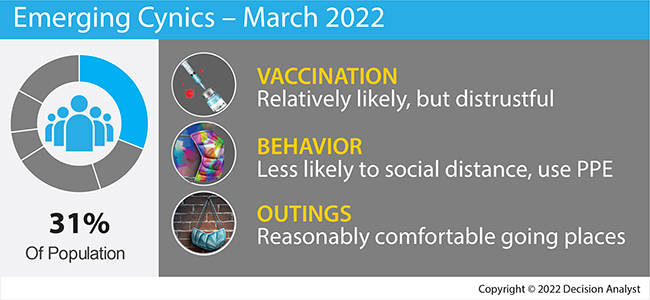
Concerned Protectors
- Skew female; appx half are aged 55+; have higher income; are more prevalent in West; are likely Democrat
- Concerned about COVID-19, yet very optimistic about improvements in 2021; relatively positive emotions and “good” to “very good” mental health
- Already vaccinated or will be; very positive attitudes about the vaccine and largely supportive of a vaccine passport
- Extremely likely to follow health/safety protocols, including double masking, even post-restrictions
- Reasonably comfortable with doing essentials like medical appointments and grocery shopping
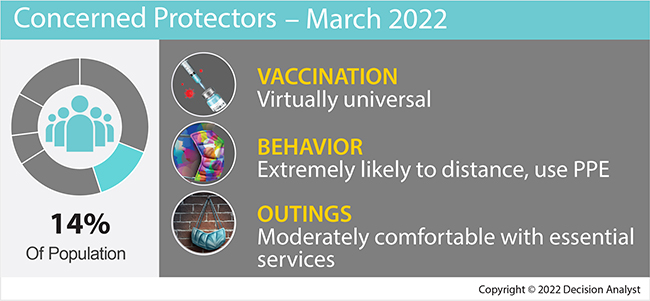
Proactive Hopefuls
- Largely females aged 35+, often with kids in HH; higher income; leans somewhat Democrat
- Moderate concern about COVID-19 and very positive outlook regarding improvements in 2021; relatively positive emotions and “good” to “very good” mental health
- Mostly vaccinated or will be; fairly positive attitudes about the vaccine; some are supportive of a vaccine passport
- Very likely to follow health/safety protocols like social distancing and masking
- Reasonably comfortable with many outings, except for close contact, larger venues, or travel
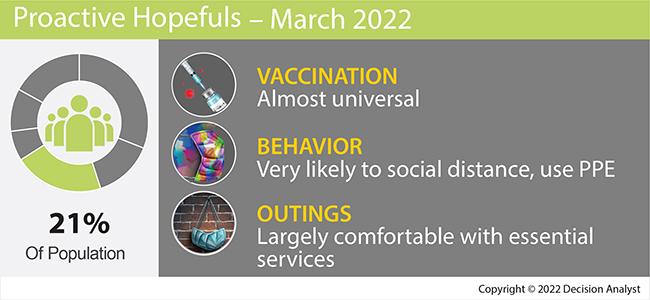
Anxious Avoiders
- Largely females 35-54, often with children in the household; middle income; higher % AA and Asian; Democrat or Independent
- Very concerned about C-19; cautiously optimistic for improved 2021; negative emotions likelier (e.g., danger, confusion, anger, fear); less positive mental health & some increasing stress
- May be vaccine hesitant, though vaccine attitudes are middle of the road
- Very likely to follow health/safety protocols, including double masking, even post-restrictions
- Largely uncomfortable with outings for all types
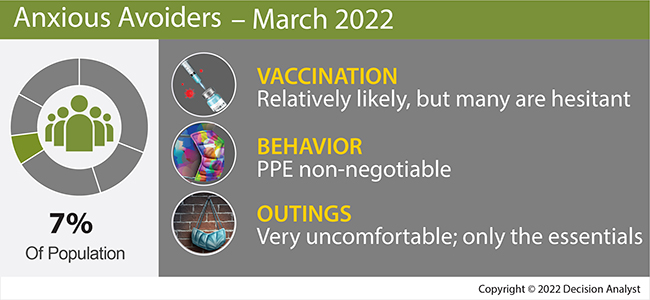
Unconcerned Naysayers
- Males and females mostly aged 35+; lowest average income; over half Republican
- Very little concern about COVID-19; cautiously optimistic outlook regarding improvements in 2021; relatively positive emotions related to pandemic, though elevated anger; steady stress levels; mostly good mental health
- Prone to more negative attitudes about COVID-19, including conspiracy theories
- Less likely to follow safety/PPE protocols; almost completely anti-vaccine
- Comfortable with almost all types of outings and gatherings
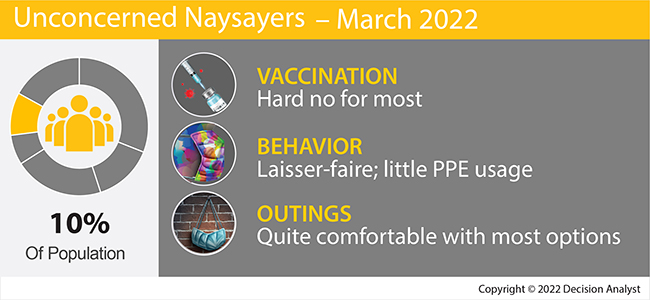
Invincible Skeptics
- Primarily males aged 35-54, often with children in the household; highest income; largest % White; Republican or Independent
- Very little concern about COVID-19; very optimistic outlook regarding improvements in 2021; positive emotions related to pandemic, “excellent” or “very good” mental health
- Prone to more negative attitudes about COVID-19, including conspiracy theories
- Some follow safety/PPE protocols; vaccine relatively likely—believe it allows return to normal
- Totally comfortable with outings and gatherings
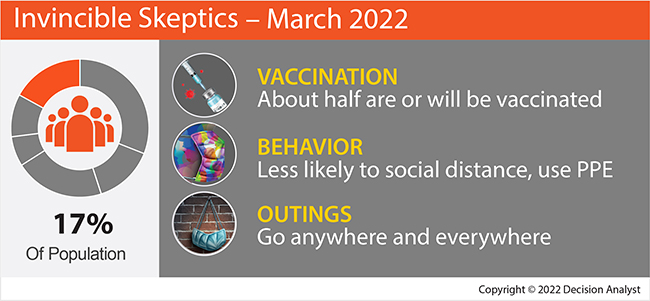
About Decision Analyst
Decision Analyst (www.decisionanalyst.com) is a global marketing research and analytical consulting firm specializing in strategy research, new product development, advertising testing, and advanced modeling for marketing decision optimization. For over 40 years, the firm has delivered competitive advantage to clients throughout the world in consumer-packaged goods, telecommunications, retail, technology, medical, and automotive industries.
Download a complimentary copy of the Consumer Foresight Beyond the Pandemic Report.
There are 2 reports available for download: January 2022: Financial Wellbeing Report and March 2022: Home Comfort.
What's Your Mindset?
Take our Consumer Mindset Typing Tool and see which segment you are in.
Contact
If you have any questions about the Consumer Mindset Segmentation or the Typing Tool please contact:
Felicia Rogers
Executive Vice President
Email: frogers@decisionanalyst.com
Phone: 1-817-640-6166
Methodology
The online surveys were conducted among adults aged 18+. Beginning in March 2020, more than 20 waves have been completed.
Wave 1 consisted of over 1,500 completes across two online surveys. Waves 2-16 were conducted among approximately 500 U.S. adults each. In Waves 17-22, there were at least 1,000 completed surveys among U.S. adults.
Logos & Images
If you are doing a story on Decision Analyst or using any of our published data, news releases or articles, you must cite "Decision Analyst" as the source of the information.
If you use any of the charts or tables from the press releases or other published materials, please email Cristi Allen at callen@decisionanalyst.com to let us know which graphics you took and for what newspaper, magazine, or website it was used.

